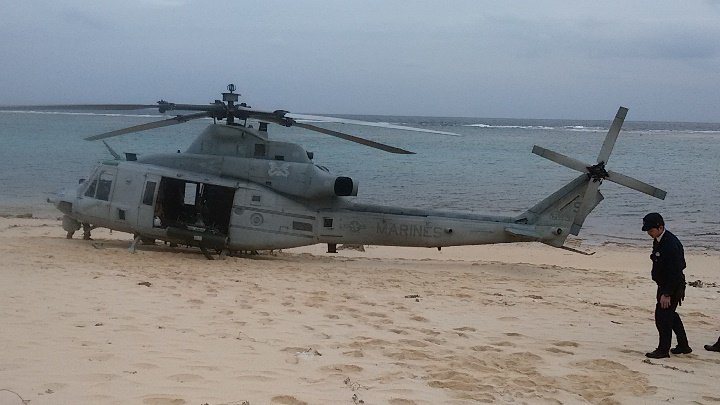
To facilitate operations for the U.S.A. helicopters, temporary airfield matting has been installed at RAAF base Darwin.

To facilitate operations for the U.S.A. helicopters, temporary airfield matting has been installed at RAAF base Darwin.

“I felt it was dangerous because the helicopter was lowering altitude and heading toward the coast with a rattling noise,” he said. “The U.S. military always prioritizes military operations and neglects the anxieties of local residents,” said Tamaki, who heads the local residents’ association.

This activity will be the fifth and final EAC activity in 2017. The exercise will involve USAF B-1Bs and RAAF aircraft conducting flying training in designated airspace away from RAAF Base Amberley.
The forward work projects involve improving the aircraft maintenance facility and expanding the aircraft parking apron at RAAF Darwin.
More than 200 Territory business were guided through the procurement system of the United States Navy by a team from the Hawaii-based Naval Facilities Engineering Command. NAVFAC is the US Department of Defence organisation responsible for the delivery and management of US-funded military construction projects in Australia. Around $1 billion is expected to be spent as part of the joint Force Posture Initiative, which involves the basing of a 2500 rotational US marine force and a significant air support.
Department of Business chief executive Michael Tennant opened the day telling the group the day was about learning how to engage with the US Department of Defence.
“Today won’t be focused on specific projects, these details will be made available in future briefings,” he said.
“Today is all about working with the US procurement system and follows the event held in late 2016."
To benefit from these opportunities, industry must be prepared to invest the time necessary to learn how to engage in the US procurement system, to gain the necessary accreditations, meet the required Australian and US standards, and follow the processes and procedures required by US Defence or their prime contractors.
“It also requires thinking about how NT businesses might partner with other businesses to grow capability and capacity.”
An Australian Defence economic impact assessment released in 2013 estimated that the rotational deployment of just 1100 Marines would increase Gross State Product by $5.6 million in 2014.

Euan Graham, the Lowy Institute's director of international security, described the presence of the F-22s as "pretty high-end coercive signalling to China". While the rotation of marines in Darwin got more attention, the stationing of planes was much more strategically significant, he said.